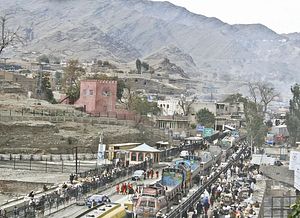Pakistan has long faced upheaval and disturbances in relations with its neighboring states, including India as well as fellow Muslim states Iran and Afghanistan. The rising tensions and counterplans of Iran, Gulf states (even Saudi Arabia), and India regarding the multidimensional China-Pakistan Economic Corridor (CPEC), with a special focus on Gwadar port, should be taken seriously by Pakistan. There is need to counter with stable strategic policies to secure Pakistan’s position in the region and fulfill the CPEC project. Any negligence or unwise steps in the region will push Pakistan back into a state of destabilization and isolation.
India and Iran’s mutual cooperation and agreements regarding Chabahar port and their mutual support to Afghanistan to safeguard India’s trade route to Central Asia poses a clear and long-persistent threat to CPEC. Afghan President Ashraf Ghani’s welcoming response to India and the recent inauguration of Salma Dam in Afghanistan by Indian Prime Minister Narendra Modi is the clearest example of India’s foreign policy strategy of strengthening its relations with regional states. Pakistan’s foreign policy, by comparison, seems to have failed; Islamabad appears incapable of developing its relations with Iran and Afghanistan to minimize any possible threat to CPEC as well as CASA.
The recent short-term flare-up at the Torkham border crossing with Afghanistan vividly represents Pakistan’s unclear and undefined foreign policy and national interests. India’s active foreign policy in the region and its growing relations with Afghanistan have stalled Pakistan’s regional policy, which seeks to secure Islamabad’s national interests in the region. The Durand border, which is 2,310 km long, is a major point of friction in the Pakistan-Afghanistan relationship. The gap in the relationship and Pakistan’s Durand-centric policy from 1947 on has brought a jumble of problems — and failures – for Pakistan’s strategic and foreign policies.
Pakistan’s decision to install a gate at the Torkham border against the will of the Afghan government could bring about major negative consequences. What is Pakistan’s future policy plan for developing a route to Central Asia via Afghanistan’s territory? For one thing, will Afghanistan agree to provide a route for Pakistan to approach Central Asia, which is the essential part of CPEC? It’s not only CPEC — other projects will be impacted by the Torkham issue as well. India and Iran have long been waiting to capitalize on the critical issue of the Pakistan-Afghanistan border. Anti-Pakistan sentiments are already at a peak in Northern and Southern Afghanistan. Add to this the Torkham incident and the national and economic interests of Pakistan will be surely damaged. The damage done to bilateral relations with Afghanistan will also create persistent threats to projects like TAPI (the Turkmenistan-Afghanistan-Pakistan-India pipeline) and CASA.
The active Indian policy to isolate Pakistan in the region seems strong and secure. As India has been funding and supporting Afghanistan in the fields of infrastructure, energy, education and the military since 2006, Afghanistan will never allow any possible threat to India’s interests within its territory. As a result, India will support anti-Pakistan policies in Afghanistan — with the full support of Iran — to destabilize CPEC and CASA at any cost. In addition, the United States will not pass up an opportunity to disturb China’s long-term future interests; Washington could join hands with India to sabotage the China-Pakistan Economic Corridor.
The Torkham gate incident is giving birth to a new geostrategic and geopolitical shift in Pakistan-Afghanistan relations, which will surely, provide an opportunity for Iran and India to complete Chabahar port and secure India’s trade route to Central Asia. Afghanistan, in response to the installation of the gate, is more likely to create serious obstacles for Pakistan to reach Central Asia and to block any economic opportunity for Pakistan to benefit from TAPI and CASA along with CPEC. Viewed from this perspective, Pakistan’s current foreign policy and future strategies are self-centered and counterproductive.
The Torkham incident is merely one symptom of Pakistan’s unclear and unstructured regional strategies. Pakistan’s backing of Afghan Taliban leaders and the killing of Mullah Mansour within Pakistan territory, in addition to the recent disturbance at Torkham border, are factors that would block Pakistan all-around strategy in the region. These emerging threats will certainly impact Pakistan’s interests in the context of CPEC, CASA, and TAPI, either directly or indirectly.
Pakistan needs to stabilize its foreign and regional policies to minimize any future threat to these regional connectivity projects. An isolated Pakistan, left in a disturbing position in the region, will badly impact Islamabad’s future plans. Pakistan cannot afford to disturb its relations with Iran and Afghanistan; any negligence and misconception in this regard will create serious threats to Pakistan and will pave a road to Pakistan’s isolation in region.
The decision by Pakistan’s government and military to build a gate at Torkham will provide short-term benefits to Pakistan, but it will definitely endanger Pakistan’s economic and regional interests in the future. The United States, Iran, Afghanistan, India and other regional states are growing hostile in these changing geopolitical times, and are particularly eager to disrupt theChina-Pakistan Economic Corridor. Any mistake or action from Pakistan’s side will surely destabilize its plans.
Abdul Rahim is an MPhil Scholar at International Islamic University, Islamabad.

































